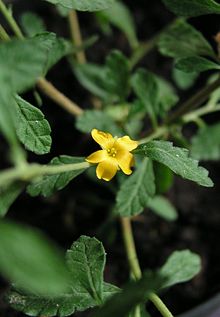- Turnera diffusa
-
Turnera diffusa 
Scientific classification Kingdom: Plantae (unranked): Angiosperms (unranked): Eudicots (unranked): Rosids Order: Malpighiales Family: Passifloraceae Genus: Turnera Species: T. diffusa Binomial name Turnera diffusa
Willd. ex Schult.[1]Turnera diffusa, known as damiana, is a shrub native to southwestern Texas in the United States,[2] Central America, Mexico, South America, and the Caribbean. It belongs to the family Passifloraceae.[3]
Damiana is a relatively small shrub that produces small, aromatic flowers. It blossoms in early to late summer and is followed by fruits that taste similar to figs. The shrub is said to have a strong spice-like odor somewhat like chamomile, due to an oil present in the plant[citation needed]. The leaves have traditionally been made into a tea and an incense which was used by native people of Central and South America for its relaxing effects. Spanish missionaries first recorded that the Mexican Indians drank Damiana tea mixed with sugar for use as an aphrodisiac.
Contents
Uses
Damiana has long been claimed to have a stimulating effect on libido, and its use as an aphrodisiac has continued into modern times. More recently, some corroborating scientific evidence in support of its long history of use has also emerged. Several studies utilizing animal testing have shown evidence of increased sexual activity in sexually exhausted or impotent male rats when exposed to damiana,[4][5] as well as generally increased sexual activity in rats of both sexes.[6] It has also been shown that damiana may function as an aromatase inhibitor, which has been suggested as a possible method of action for its reputed effects.[7]
Damiana is an ingredient in a traditional Mexican liqueur, which is sometimes used in lieu of Triple Sec in margaritas. Mexican folklore claims that it was used in the "original" margarita. The damiana margarita is popular in the Los Cabos region of Mexico.[8][9]
While scientists have found inconclusive data on damiana, it has recently been shown that a chemical essential to the plant's structure, damianin, has relaxing effects on the central nervous system. This chemical may therefore account, in part, for the reports of relaxation effects, however the research involved is limited at this point.[citation needed]
In popular culture
In the CSI: NY episode "Like Water for Murder", Damiana was featured mixed with chocolate.[10] This in turn alludes to Laura Esquivel's novel "Like Water for Chocolate".
Legality
In Louisiana, USA, Damiana is considered a "prohibited plant" along with 39 other plants by Louisiana Act No 159, effective August 8, 2005. Any combination of any of the parts, leaves, stems, stalks, seeds, materials, compounds, salts, derivatives, mixtures, preparations, or any resin extracted from any part of the plant is illegal to possess or distribute for human consumption in the state of Louisiana. This is due to a recent, alarming increase in the number of calls made to U.S. Poison Control Centers regarding legal highs, a majority coming from Louisiana.[further explanation needed][11] [12][13]
References
- ^ "Turnera diffusa". Integrated Taxonomic Information System. http://www.itis.gov/servlet/SingleRpt/SingleRpt?search_topic=TSN&search_value=22215. Retrieved 2011-01-29.
- ^ Everitt, J. H.; Dale Lynn Drawe; Robert I. Lonard (2002). Trees, Shrubs, and Cacti of South Texas. Texas Tech University Press. p. 208. ISBN 9780896724730. http://books.google.com/books?id=8cEq7weUPYYC&.
- ^ "Taxon: Turnera diffusa Willd.". Germplasm Resources Information Network. United States Department of Agriculture. 2009-05-11. http://www.ars-grin.gov/cgi-bin/npgs/html/taxon.pl?40777. Retrieved 2011-01-29.
- ^ Arletti, R., Benelli, A., Cavazzuti, E., Scarpetta, G., & Bertolini, A. (September 1998), "Stimulating property of Turnera diffusa and Pfaffia paniculata extracts on the sexual behavior of male rats", Psychopharmacology 143: 15–19
- ^ Estrada-Reyesb, K.R., Ortiz-Lópeza, P., Gutiérrez-Ortíza, J., & Martínez-Mota, L. (June 2009), "Turnera diffusa Wild (Turneraceae) recovers sexual behavior in sexually exhausted males", Journal of Ethnopharmacology 123: 423–429
- ^ Kumar, S., Madaan, R., & Sharma, A. (2009), "Evaluation of Aphrodisiac Activity of Turnera aphrodisiaca", International Journal of Pharmacognosy and Phytochemical Research 1: 1–4
- ^ Zhao, J., Dasmahapatra, A.K., Khan, S.I., & Khan, I.A. (December 2008), "Anti-aromatase activity of the constituents from damiana (Turnera diffusa)", Journal of Ethnopharmacology 120: 387–393
- ^ Damiana Liqueur at Damiana.net
- ^ Perry, Charles (2007-06-20). "The unexpected thrill". Los Angeles Times. http://articles.latimes.com/2007/jun/20/food/fo-drink20.
- ^ Huntley, Kristine (2008-04-17). "CSI: New York--'Like Water For Murder'". CSI Files. http://www.csifiles.com/reviews/csi/like_water_for_murder.shtml. Retrieved 2011-01-29.
- ^ Legislature of Louisiana: Regular Session, 2010; Act No. 565; House Bill No. 173
- ^ [1]
- ^ http://www.erowid.org/herbs/damiana/damiana_law.shtml
(12)^ "Damiana Legal Status." Erowid. N.p., 30 Oct 2011. Web. 3 Nov 2011. <http://www.erowid.org/herbs/damiana/damiana_law.shtml>.
(13)^ Richards, Brandon. "Fake pot now illegal in Louisiana." KPLCtv.com. (2010): n. page. Web. 3 Nov. 2011. <http://www.kplctv.com/story/12980453/fake-pot-now-illegal-in-louisiana?redirected=true>.
External links
Categories:- Turnera
- Mexican liquor
- Flora of the Bahamas
- Flora of Brazil
- Flora of the Cayman Islands
- Flora of Central America
- Flora of Cuba
- Flora of Hispaniola
- Flora of Jamaica
- Flora of Mexico
- Flora of Puerto Rico
- Flora of the Turks and Caicos Islands
- Flora of Southwestern Texas
- Passifloraceae stubs
- Hallucinogen stubs
Wikimedia Foundation. 2010.
